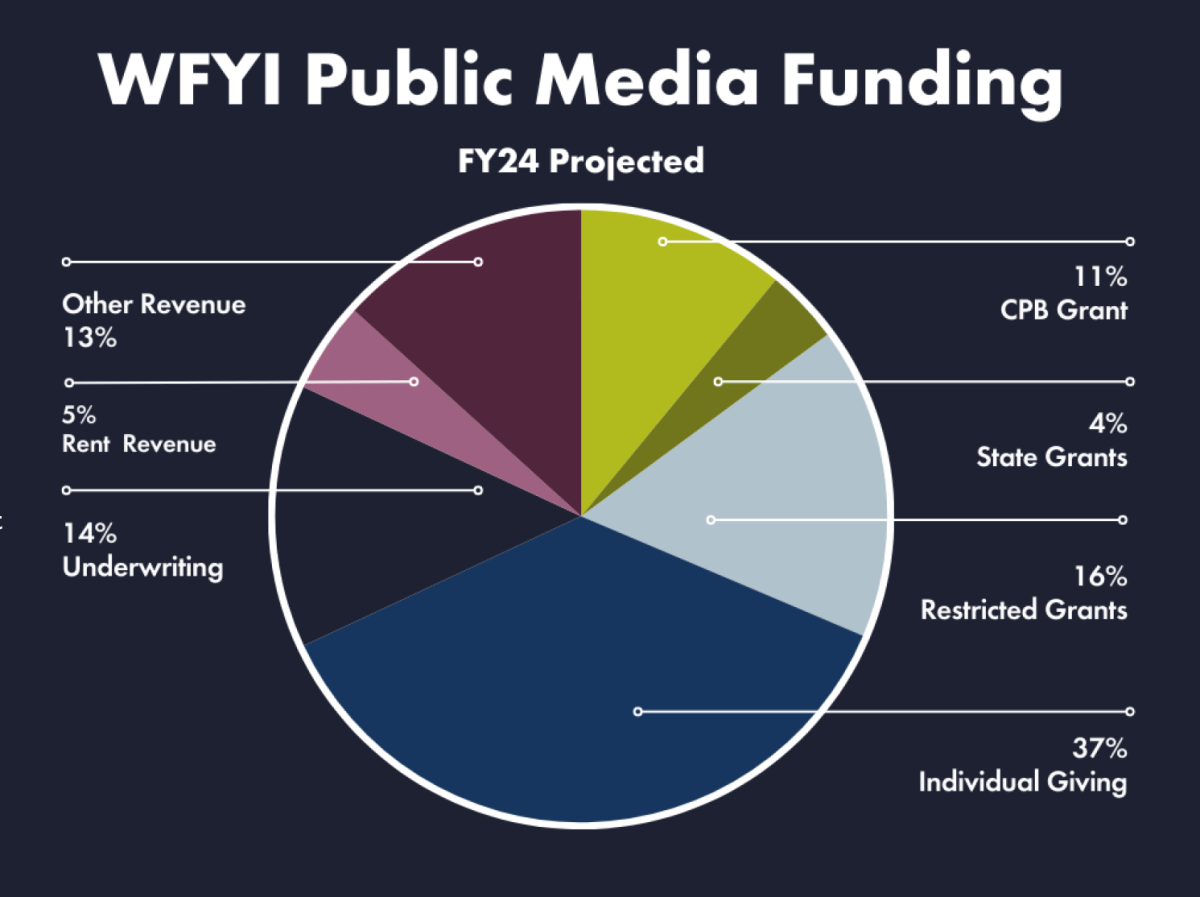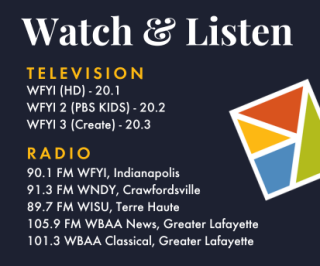
WFYI Public Media is a nonprofit organization that is funded largely through the support of our generous donors, sponsors and grant funders. We receive 11% of our annual budget from the Corporation for Public Broadcasting (CPB), an independent nonprofit that distributes federal dollars (an average of $1.60 per American) to local TV and radio stations across the country. The majority of our funding comes from our local community, but funding from CPB plays an essential role in sustainability. Growing threats to funding put access to local services at risk.
We are going to break down a few things here to keep you informed:
- Learn more about federal funding and the Corporation for Public Broadcasting
- Dive into questions about WFYI and public media in general
- Read more about why public media is essential to our community
- What you can do to support WFYI at this time
- Links to learn more
More about Federal Funding
Federal funding is foundational for public media, representing an essential portion of station budgets. It enables stations to provide free educational content, local programming and critical emergency alerts. Without it, many stations, especially in rural areas, would struggle to operate.
Source: CPB Appropriation Overview
What is the Corporation for Public Broadcasting’s role in public media?
The CPB is the Corporation for Public Broadcasting and is distinct from NPR and PBS. CPB is not a broadcast organization, but an independent, nonprofit corporation created by Congress in 1967 with two primary functions: to serve as a firewall between partisan politics and public broadcasting, and to help fund programming, stations and technology. Funding for CPB is established through the federal budget annual appropriations process. Traditionally, Congress provides an advance appropriation to CPB so stations can plan and purchase programs knowing that CPB funding will be available for at least two years and will be insulated from political pressures.
CPB is responsible for allocating its funds from the federal budget in any way that fulfills their mission: to ensure universal access, over-the-air and online, to high-quality content and telecommunications services that are commercial free and free of charge.
How much does the federal government invest in public media?
Public media provides incredible value for such a small investment. The $545 million currently appropriated by Congress amounts to about one one-hundredth of one percent (0.0073%) of the federal budget. That works out to be about $1.60 per person per year. That minimal investment ensures access to trustworthy news, educational resources and cultural programming for ALL Americans — regardless of income or geography.
What would the federal defunding of public media mean for local communities?
The loss of CPB funding could disproportionately harm rural and underserved communities, reducing access to trusted news, educational resources and emergency alerts. Millions of Americans rely on these services as their primary or only source of information.
According to recent station financial reports to CPB, rural stations depend more on CPB funding than urban stations. CPB grants -- represented 17 percent of an average rural station’s revenue, versus 9 percent for non-rural stations. Almost half of all rural grantees – 120 stations – relied on CPB for at least 25 percent of their revenue while 33 rural stations – many on Native American reservations – relied on CPB funding for at least 50 percent of their revenue.
Source: CPB Support for Rural Stations
More about WFYI and public media

Corporation for Public Broadcasting Grants: Includes funding from the CPB; a private, nonprofit corporation authorized by Congress in the Public Broadcasting Act of 1967, that supports our core programming and outreach initiatives.
State Grants: Includes funding received from the State of Indiana that helps support our core programming and outreach initiatives.
Individual Donations: Contributions from generous individuals who believe in our mission and provide essential support for our day-to-day activities and special projects.
Underwriting: Funding from businesses and corporations that align with our values and support our programming through sponsorships and partnerships.
Restricted Grants: Grants from various foundations dedicated to supporting public media and community-focused projects.
Rent Revenue: Revenue from building tenants.
Other Revenue: Miscellaneous sources of funding such as event revenues, merchandising, and other contributions not categorized elsewhere.
What makes public media unique and why should taxpayers continue funding it when commercial media exists?
Public media stations prioritize educational, unbiased and community-focused programming, free from the influence of advertisers, ensuring a focus on public service rather than profit. Unlike private outlets, which are often driven by commercial interests, public media is committed to providing trustworthy news, educational resources and cultural programming to all Americans — regardless of income, geography or advertiser return on investment. As a no-cost, commercial-free, local, nonprofit service, public media serves every community — rural and urban, wealthy and underserved. This mission is especially vital in economically disadvantaged, rural and bandwidth-limited areas where commercial media often does not reach.
Is public media biased?
Public media seeks to present diverse perspectives and context beyond the headlines. At WFYI, we occasionally hear from listeners who think we are either too liberal or too conservative. We intend to be neither. Our journalists take responsibility of reporting the facts as their number one mission. Public media adheres to strict editorial standards that emphasize accuracy, transparency and fairness, helping it maintain trust across the political spectrum. Surveys show Americans regard PBS as one of the most trusted news sources.
Sources: PBS Trust Survey Flyer, 2024; PBS Standards
What does the FCC have to do with public media?
WFYI accepts underwriting support to help offset acquisition, production and maintenance costs associated with broadcasting a variety of programs. In exchange for this support, WFYI broadcasts on-air announcements of all underwriters in compliance with Federal Communications Commission (FCC) rules and regulations.
As a public, not-for-profit radio station, WFYI is bound by FCC guidelines for underwriting announcements, intended to preserve the non-commercial nature of public broadcasting. Underwriting announcements are permitted to identify who the sponsor is, what they do and how they can be reached.
Links to learn more about WFYI
- WFYI’s most recent Community Impact Report
- WFYI News Editorial Integrity Guidelines
- WFYI’s Monthly Insider’s Magazine
What impact does public media have in the community?
For WFYI Public Media and other public media organizations, federal funding is critical for several key reasons:
Ensuring Universal Access
Not everyone has access to high-speed internet or paid streaming services, particularly in low-income and rural communities. WFYI provides free, over-the-air broadcasting, ensuring that news and information, high-quality educational and cultural programs remain accessible to all. In addition, WFYI is part of the Indiana Public Broadcasting collaboration which reaches 95% of Hoosiers.
Trusted, Local Non-Commercial Content
Unlike many commercial outlets driven by advertising revenue, public media stations prioritize educational, informative and community-focused content that may not be commercially viable but is valuable to the community. WFYI offers fact-based journalism, in-depth documentaries, arts and culture programming and educational resources that parents, educators, and viewers trust.
PBS KIDS helps children, especially those in underserved communities
Because every child deserves access to high-quality educational opportunities, PBS KIDS is available for free on TV, across digital platforms and in communities across America. PBS Kids is trusted by parents and educators alike and its educational content helps bridge the digital divide and improve early learning outcomes. Additionally, PBS LearningMedia offers thousands of lesson plans and resources to educators free of charge.
Emergency and Public Safety Communications
Many public media stations provide emergency alerts and public safety messaging, serving as a critical resource during natural disasters or other emergencies. From severe weather warnings and AMBER alerts to large-scale event monitoring and school security, public media member stations keep Indiana communities informed and prepared. When a natural disaster strikes, in many communities across the country, it’s the public broadcasting station that people turn to for critical information in real time.
How to support
You may wonder what you can do NOW to keep WFYI operational and strong in the community. Whether you’re new to WFYI content or have been giving since 1970, we have some ideas for another step you can take to support WFYI and inspire action in others.
Ways to Connect
- Sign up for the Best of WFYI email, the WFYI Streaming Guide, WFYI Live event email or This Week in Indiana Politics. Sign up here to stay connected.
- Activate WFYI Passport for on-demand access to your favorite PBS & local shows
- Subscribe to NPR+ for sponsor-free listening
- Follow WFYI on social media (YouTube, Facebook, Instagram, LinkedIn and TikTok)
Ways to Engage with WFYI
- Attend a WFYI Live event, including conversations, performances, screenings, trivia and character meet & greets.
- Join a WFYI Membership Group (with screenings and events for British Telly Club and WFYI Family Members).
- Get involved in WFYI’s volunteer program and help us at events, or in the office.
- Engage with WFYI content on all platforms – you can like and share our posts with your friends and followers.
Ways to Support WFYI
- Increase your annual giving amount or consider making an additional gift to WFYI.
- Join the Inner Circle, WFYI’s leadership giving society.
- Explore other ways to support WFYI, including donor advised funds, bequests, retirement plans, stocks & life insurance, qualified distributions or real estate & property donations.
- Donate a vehicle and purchase a WFYI specialty license plate through the BMV.
Ways to Advocate for WFYI
- Record a WFYI testimonial and share why you support public media.
- Sign up for Protect My Public Media email updates at protectmypublicmedia.org.
- Proudly wear your WFYI swag and share with friends and neighbors
 DONATE
DONATE





 Support WFYI. We can't do it without you.
Support WFYI. We can't do it without you.